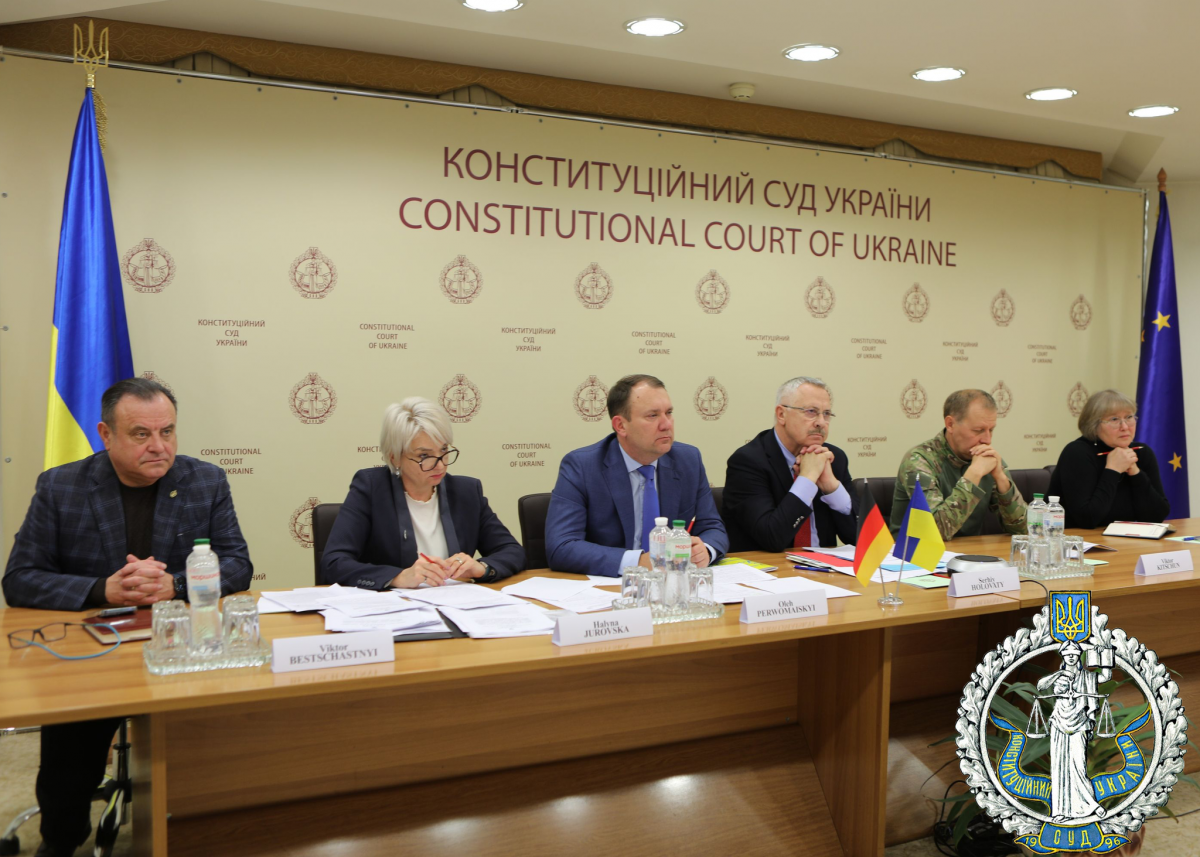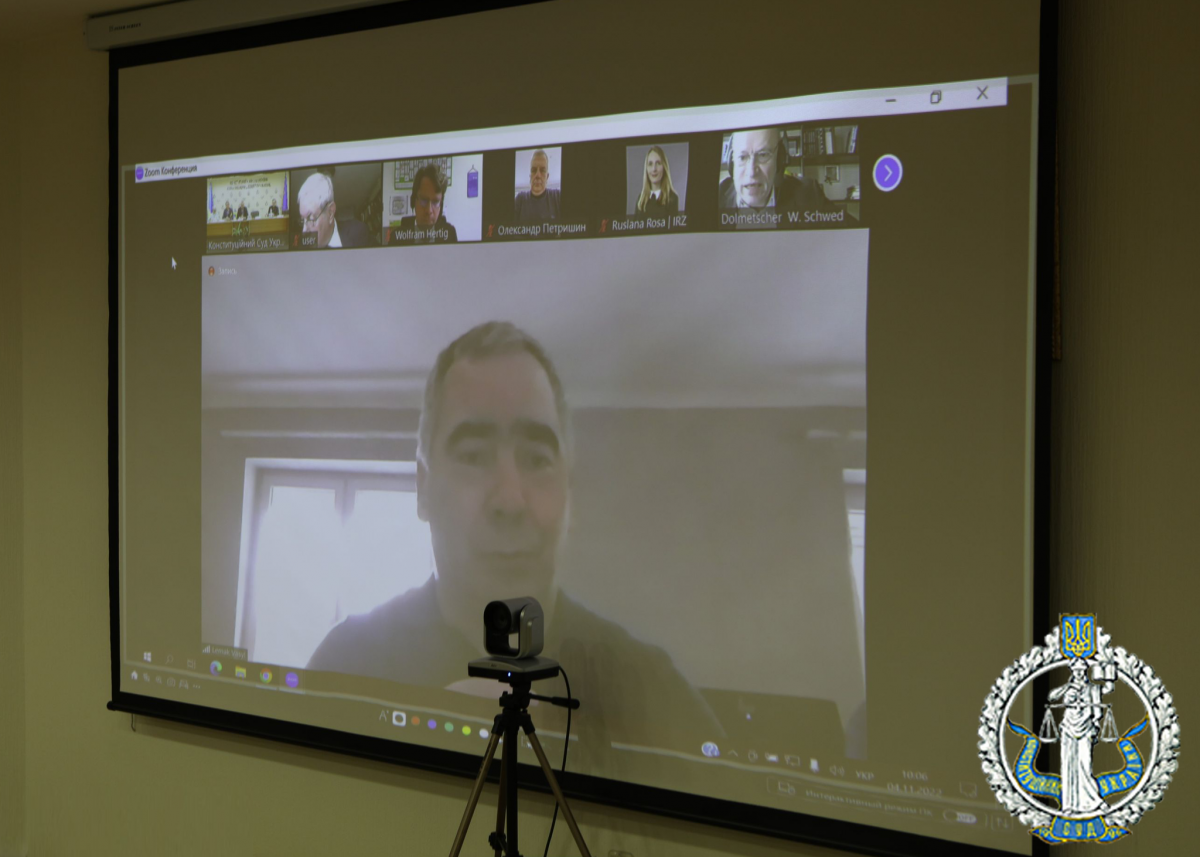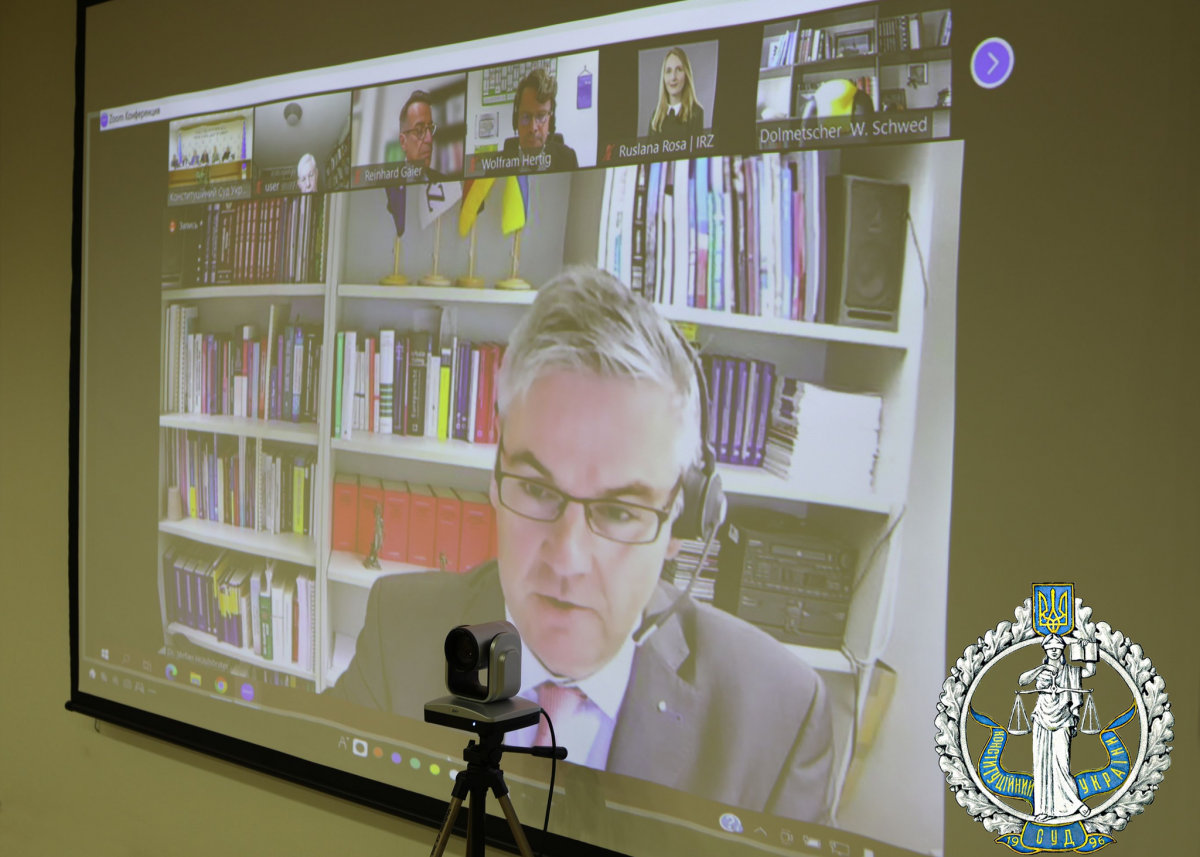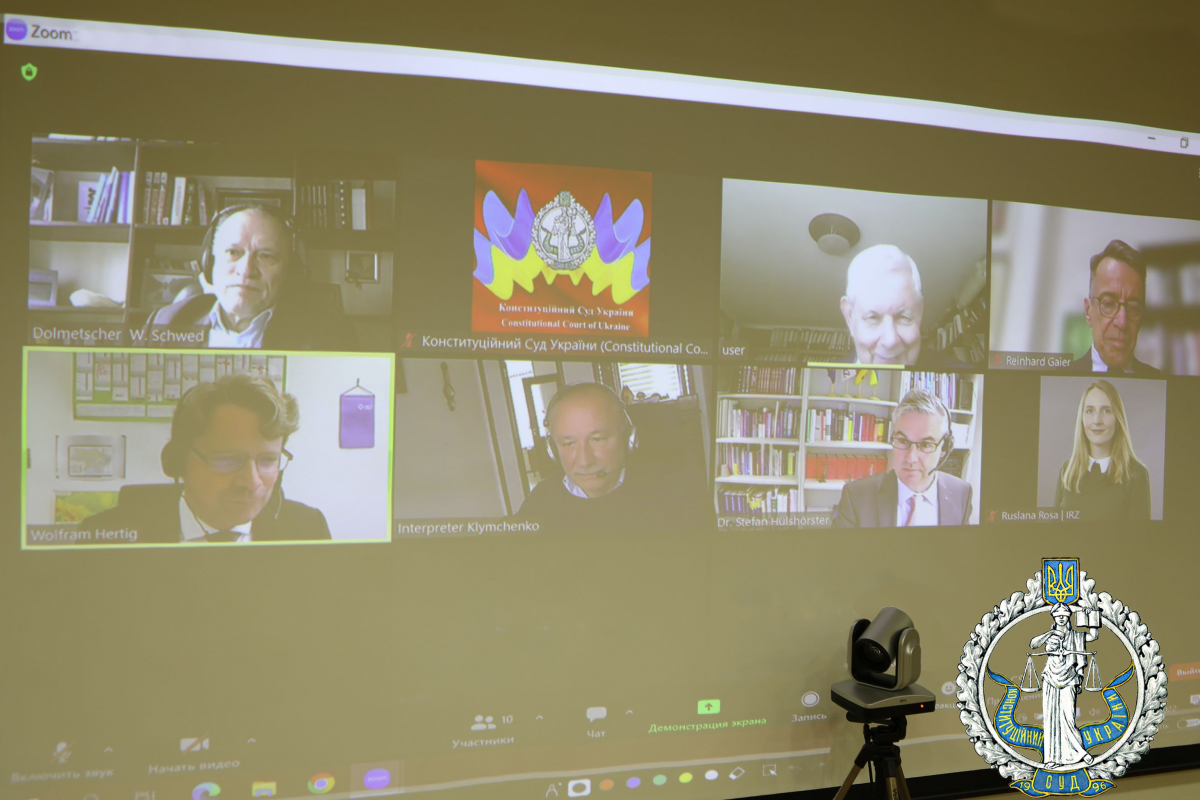Over the course of two days, on November 3-4, judges of the Constitutional Court of Ukraine together with representatives of the German Foundation for International Legal Cooperation (IRZ) held an online meeting within the framework of a professional exchange of experience in constitutional law domain.
The major subjects covered during the professional exchange were as follows: challenges related to timely and effective execution of constitutional court decisions, disciplinary responsibility of constitutional court judges, and the procedure for selecting and appointing Federal Constitutional Court judges.
Among the participants of the meeting were judges of the Constitutional Court of Ukraine Serhiy Holovaty, Vasyl Lemak, Oleh Pervomaiskyi, Galyna Yurovska, Oksana Hryshchuk, Viktor Kychun, Oleksandr Petryshyn, Director of the IRZ Fund Stefan Hülshörster and retired judges of the Federal Constitutional Court of Germany Reinhard Gaier and Udo Steiner.
At the beginning of the meeting, Acting Chairman of the CCU Serhiy Holovaty extended his heartfelt gratitude for the opportunity to listen to the reports of foreign colleagues and exchange views on professional issues. He also expressed his appreciation to colleagues from the IRZ, as well as the German state and the German people for their effective support of the Ukrainian state during a terrible chapter in its history in the 21st century.
“Germany is doing a lot to help Ukraine, which has been fighting hard for its freedom and independence for nine months in the war with Muscovy,” emphasised Serhiy Holovaty.
Serhiy Holovaty briefed foreign partners on the activities of the Constitutional Court in times of war. He stressed, in particular, that despite Muscovy’s military action against Ukraine, the Constitutional Court of Ukraine continues to exercise its constitutional powers to establish the supremacy of Basic Law of Ukraine throughout the territory of our State and to protect the constitutional human and citizen’s rights and freedoms. “In such conditions, despite constant air alarms, we try to work and make decisions. During this time, the Grand Chamber adopted 2 decisions on constitutional petitions and 8 decisions were delivered in the senates of the Court on constitutional complaints.” According to him, citizens of Ukraine continue to apply to the Constitutional Court. Since the beginning of the year, the Court has received one and a half hundred constitutional complaints, 90 of which have already been distributed to judge-rapporteurs. Serhiy Holovaty also informed that the Constitutional Court of Ukraine was making efforts to internationally isolate the constitutional courts of Muscovy and Belarus, which directly or indirectly participated in the legitimisation of the aggressive actions of the governments of these states.
“Thanks to our efforts and cooperation with our colleagues, today the Constitutional Court of Moscow is no longer a member of the World Conference of Constitutional Justice and the Conference of European Constitutional Courts.”
Judge Viktor Kychun, joining the discussion, also expressed his sincere gratitude for the help provided by Germany to Ukraine. The judge also noted that throughout the war, the domestic body of constitutional review had continuously exercised its powers. He emphasised that the principle of institutional continuity of work of state bodies in Ukraine is fully implemented, despite russia’s military aggression against Ukraine and difficult working conditions.
The IRZ Director, Stefan Hülshörster, pointed out the importance of cooperation and exchange of experiences, which are mutually beneficial. According to him, the topics chosen for the discussion are extremely relevant, especially the issues regarding the execution of decisions of the Constitutional Court of Ukraine, in particular by state institutions, as this is necessary to ensure the rule of law.
Stefan Hülshörster noted that in the context of Ukraine obtaining the status of a candidate for EU membership, there are many challenges that need to be answered, and he assured Ukraine of further support.
Judges of the Constitutional Court of Ukraine Oleh Pervomaiskyi and Galyna Yurovska in their presentations placed a special focus on the problem of timely and effective execution of the Constitutional Court’s decisions.
Oleh Pervomayskyi informed the German colleagues about the activities of the Grand Chamber and the Senates of the Court, noting that during its activity, the Constitutional Court of Ukraine had delivered 388 decisions and provided 42 opinions. According to the judge, there is a significant problem with the execution of the decisions of the Constitutional Court, in which certain acts were declared unconstitutional. In this context, the judge noted that in the last 5 years, out of 46 decisions that were subject to undoubted execution, only 16 were executed, which is 35 percent.
In his presentation, Oleh Pervomayskyi analysed in detail the issues that arise when searching for the constituent mechanisms of executing the decisions of the Constitutional Court, and the powers of the Court itself in this process.
Judge Galyna Yurovska also shared her vision on the outlined issue. She noted that, unlike courts of general jurisdiction, whose decisions are executed by the State Executive Service, the Constitutional Court of Ukraine should independently take care of the execution of its decisions.
She reiterated that the Constitution of Ukraine stipulates that the decisions of the Constitutional Court shall be executed, but noted that during the Court’s activity, 105 decisions have not yet been executed. Galyna Yurovska drew particular attention to the reasons for such non-execution and referred to the cases when, in fact, the legislator in some cases re-enacted similar legislative regulation on those issues in which the Constitutional Court established unconstitutionality. Therefore, the important role in the process of execution decisions, the judge emphasised, belongs to the legislator.
Retired judges of the Federal Constitutional Court of Germany, Reinhard Gaier and Udo Steiner, also expressed their views on certain issues. They shared their experience and talked about the execution of the decisions of the Federal Constitutional Court of Germany. They informed that in Germany there are also similar cases of repeated adoption of laws, where the Federal Constitutional Court previously declared their unconstitutionality. In the future, such laws were subject to repeated constitutional review.
The participants also discussed the disciplinary liability of judges of the Constitutional Court of Ukraine. Judge Vasyl Lemak was the main speaker on this topic. He emphasised that judges understand the importance of the institution of disciplinary liability, while also stressing that they do not tolerate when disciplinary measures are used as an instrument to pressure on judge. In his opinion, the disciplinary liability of a judge should be a means of supporting his or her high moral behaviour, and not an instrument of encroachment on his or her independence. In his report, Vasyl Lemak analysed the development of the institution of disciplinary liability of judges of the Constitutional Court of Ukraine in recent decades, the practice of its application, and spoke about how the constitutional and legislative regulation of this institution has changed. According to him, an important result of the 2016 constitutional reform is the introduction of procedural guarantees against the dismissal of a judge of the Constitutional Court of Ukraine, which require at least two-thirds of the judges of this Court when deciding on the judge dismissal. It is also important that today the subjects of appointment of judges are already deprived of the authority to dismiss them. Currently, only the Constitutional Court of Ukraine is vested in the authority to bring a judge to disciplinary liability. At the same time, he drew attention to the fact that the Constitution of Ukraine and the Law of Ukraine “On the Constitutional Court of Ukraine” do not clearly define the grounds for disciplinary liability of judges of the Constitutional Court. In addition, he emphasised that procedural guarantees for a judge in respect of whom a disciplinary case is being considered, are not enough, since the formula of the constitutional prescription regarding the commission of a “substantial disciplinary offence” and precisely “incompatible with the status of a Constitutional Court Judge” remains unclear. Furthermore, judge Vasyl Lemak dwelt upon the issue of effective legal means of a judge in connection with bringing him or her to disciplinary liability. In addition, the judge noted the inadmissibility of the legislator to politicise the institution of disciplinary liability of judges of the Constitutional Court of Ukraine.
The retired judge of the Federal Constitutional Court of Germany, Reinhard Gaier, informed about the procedure for the selection and appointment of judges of the Federal Constitutional Court. In particular, he spoke about the selection bodies, the criteria and requirements for candidates, the legal regulation of the selection procedure, the role of political “considerations” and their exclusion during selection.
At the end of the meeting, the participants thanked each other for informative reports and expressed their wish for the continuation of such professional exchanges of views in the future.





